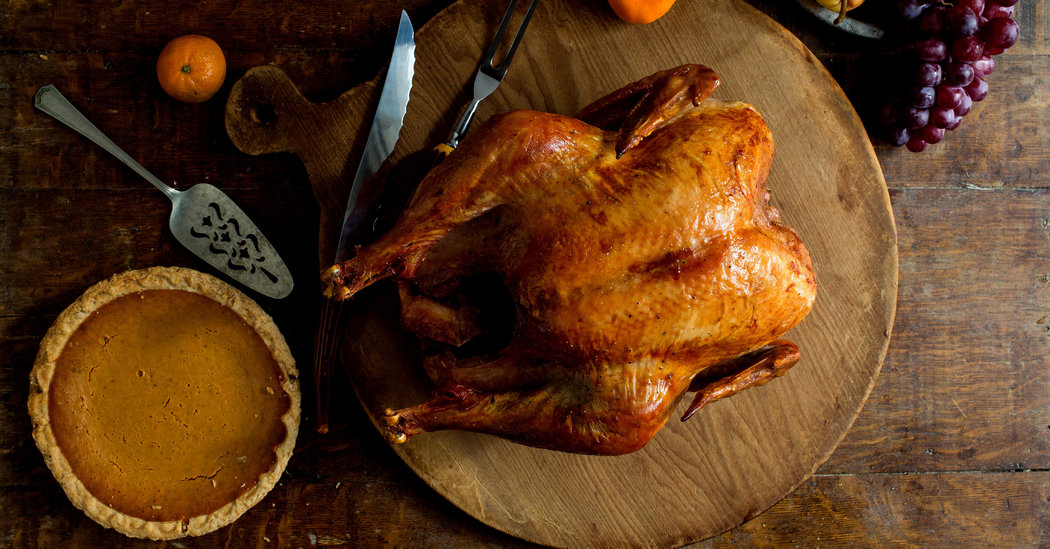
Good morning. Do you brine your Thanksgiving turkey? I have. I’ve also worn very, very skinny ties, and swept my hair up in a kind of poof, as if I’d taped a bird’s wing to my forehead. (Currently in order to do that I would have to tape a bird’s wing to my forehead.) Which is to say: I used to brine. (I used to have hair!)
Now I just salt the bird and let it sit in the fridge to dry for a day or so before roasting. Or I roast it with butter under the skin. I might brine a rare-breed heritage bird, skinny and lean. I would not brine a turkey bound for the fryer. (I’ve done so and exploded it.) Circumstances matter: the kind of turkey; the method of cooking; the amount of free time I have between When I Can Get Out of Work and When the Guests Arrive.
Kim Severson explored the subject of turkey brines for the Food desk of The Times this week, discovering how after two decades of flying high, the practice has been losing altitude among the food-media influencers (it me?) who first sent it soaring. A lot of people are over brining. I salute them this Thanksgiving. Here is all you need to know about how to cook turkey (above).
Alison Roman wrote for us this week as well, a guide to cooking cauliflower that provides some exciting new recipes you may want to try in coming days. Lemony cauliflower with hazelnuts and brown butter is a fresh new take on steamed cauliflower, an excellent accompaniment to chicken meunière. Spice-roasted cauliflower with feta and garlic could be your dinner some night soon, with warm pita and yogurt. And cauliflower gratin with leeks and white Cheddar could come to Thanksgiving as a first-time guest. It’s among the simplest gratins imaginable.
For Wednesday dinners, I try to cook without a recipe, in the hopes of passing along a theme on which you might improvise: a no-recipe recipe that’s designed to intrigue. This week: eggs for dinner, on toast, with a mushroom gravy and wilted greens. Start with the gravy: Sauté sliced mushrooms in butter until they’ve released their liquid and that liquid is gone. Hit them with salt and pepper, and then with enough cream that it can reduce a little, and you’ll think of it as gravy. Pour the mushrooms and their sauce into a small bowl and wipe out the pan. Heat some olive oil in it over medium-high heat, and toss in a bunch of leafy greens — some Tuscan kale, for instance — to wilt them. Put these greens on a plate next to the mushroom gravy and return the pan to the heat. Add olive oil and a pat of butter to melt while you put toast in the toaster. Crack as many eggs as you need into the fat and cook as you like — I like sunny side up, with lacy edges.
Toast is done. Top it with mushroom gravy, then greens and then an egg like a hat. Salt and pepper the dish and serve. Very nice.
There are thousands and thousands more ideas for what to cook on NYT Cooking. (Braised tofu in caramel sauce, for instance. This great tuna salad. Vietnamese-style shrimp cakes. Pork Parm!) Go look around and see what piques your interest. (You will need a subscription. You will, I think, enjoy having it.) And should anything go wrong while you’re there, please get in touch so we can get you sorted. We staff the inbox at cookingcare@nytimes.com. We’re also on Instagram and Facebook and Twitter. (You can always escalate matters by writing me directly: foodeditor@nytimes.com.)
Now, please take some time to read our Julia Moskin in The Times, on the experiences of recent immigrants cooking their inaugural American holiday feast. It’s “The First Thanksgiving,” and it’s excellent.
(I’m not sure I would say that about the finale of “House of Cards,” on Netflix, but neither could I look away.)




